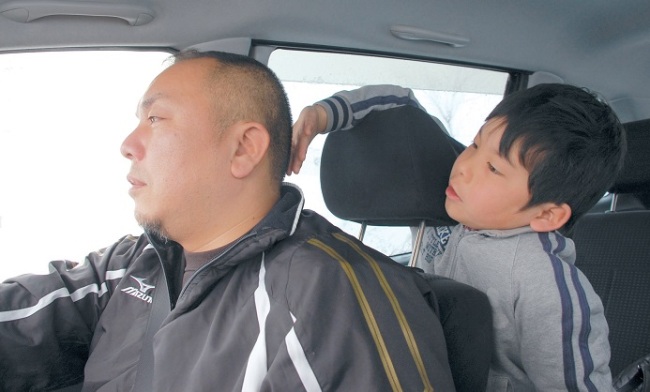MINAMI-SOMA, Japan (AP) ― Japan’s radiation nightmare has turned the lively home that truck driver Takahiro Ishitani once shared with his wife and three sons into a cluttered bachelor pad.
A coffee mug full of cigarette butts, a towel and other odds and ends sit on a low table in the apartment’s small living room. He offers a visitor a takeout box lunch, his main source of sustenance these days. Laundry hangs inside so it won’t absorb the radiation that remains in the ground, two years after an earthquake and tsunami caused meltdowns and explosions at the Fukushima Dai-ichi nuclear power plant, about 30 kilometers to the south.
 |
Takahiro Ishitani drives a car as his son touches his head as they go shopping during his weekend stay in Iide, Yamagata prefecture, Japan. (AP-Yonhap News) |
To escape this lonely weekday existence, the 42-year-old Ishitani drives three hours up winding roads every weekend to see his family, which has moved away because of fears that radiation could harm the children.
“If it really is safe, I want them to come back,” says Ishitani, a stocky man with a small beard on the tip of his chin. “But it’s hard to know. Different people say different things, and that adds to my stress. I don’t know whom to trust.”
Just as with Three Mile Island and Chernobyl, mental distress could be one of the biggest health issues to emerge from this disaster, experts say. While attention has focused on the potential cancer risks, they remain unclear. What is clear is that the uncertainty and the upheaval it’s caused in people’s lives is already exacting a very real and pervasive psychological toll.
“It’s one of the biggest problems,” said Seiji Yasumura, a professor of public health at Fukushima Medical University.
Ishitani collapsed on the street with an ulcer nine months into the disaster. He was hospitalized for three days and still takes stomach medicine. The slightest tremor wakes him at night, and then he can’t go back to sleep as he worries about the future.
Will his youngest son, 8-year-old Ryusei, ever be able to play in the woods and catch crawfish in the river as Ishitani did as a child? How long can his family continue this divided life? Will his now half-deserted hometown of Minami-Soma even survive ― or shrivel and die?
More than a decade after the 1986 Chernobyl accident, mothers of young children who were evacuated had twice the rate of post-traumatic disorders than the general population, according to Evelyn Bromet, a psychiatrist at the State University of New York, Stony Brook.
A health questionnaire sent to Fukushima residents by Fukushima Medical University showed that about 15 percent of 67,500 respondents indicated high levels of stress on the Kessler Psychological Distress Scale, a commonly used test to gauge stress, much higher than the 3 percent among the general population.
The survey results, compiled through June, the most recent available, also showed 21 percent scored high on a checklist used to screen for post-traumatic stress disorder.
As Ishitani runs errands around Minami-Soma in his four-ton truck, he wonders out loud whether his family should return to a place where hardly any children ride bikes anymore for fear of touching the contaminated ground.
“Look around. There aren’t many kids playing outside,” he says as he points to an empty playground. “A lot of people say that 5 to 10 years down the road, this town isn’t going to survive. When I think about that, too, I wonder if it’s right to bring my son back to a town that’s shrinking.”
Later, outside his apartment, Ishitani holds a beeping Ukrainian-made Geiger counter near the ground next to his parked minivan: 3 microsieverts per hour. A regular chest X-ray gives a dose of about 50 microsieverts. He used to check radiation levels regularly, but has stopped doing it much because “it just got to be silly.”
Hardly any progress has been made in decontaminating the area, and many doubt the cleanup ― hosing down walls, carting away topsoil ― is effective.
“I don’t care about how much radiation I absorb,” Ishitani says. “But when I think about the impact it might have on my child, I can’t let him come back.”
Ishitani and his family fled abruptly in the middle of the night three days after the tsunami hit. A friend called to warn them that a second reactor might explode and that their lives were in danger.








